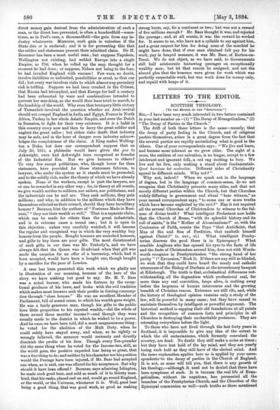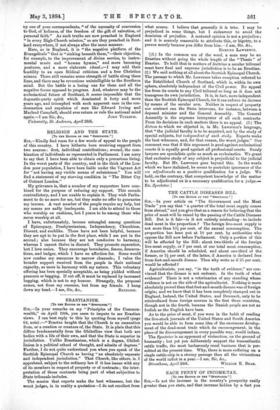LETTERS TO THE EDITOR.
SCOTTISH THEOLOGY.
rTo THE EDITOR OF TEE "SPECTATOR.'] SIR,—I have been very much interested in two letters contained in your last number on—(1) "The Decay of Evangelicalism," (2) "The Decay of Parties in the Church."
The drift of both these letters is the same—namely, that the decay of party feeling in the Church, and of religions parties themselves, arises in a great degree from the fact that the several parties are rapidly assimilating what is good in the others. One of your correspondents says : " We live and learn, and become more tolerant as we grow older. The sight of a cross, the emblem of our salvation, is no longer, except to a few intolerant and ignorant folk, a red rag inciting to fury. We live and let live, only making a stand about fundamentals. Qtcot homines tot sententice. Different sides of Christianity appeal to different minds. Why not?"
Why not, indeed ? When we speak not in the language of dogma, but in the language of common-sense, do we not recognise that Christianity presents many sides, and that not merely different parties within the Church, but that Churches widely differing in government and ritual "bear witness," as your second correspondent says, "to some one or more truths which have become negleCted by the rest ?" Has it not required all the several Churches of Christendom to witness to the ful- ness of divine truth? What intelligent Protestant now holds that the Church of Rome, "with its splendid history and its roll of saints," is the "Mother of Abominations ?" or, with the Confession of Faith, counts the Pope "that Antichrist, that Man of Sin and Son of Perdition, that exalteth himself
against Christ ?" (c. xxv., vi.) What intelligent Presby- terian disowns the good there is in Episcopacy ? What sensible Anglican who has opened his eyes to the facts of life and the facts of Christendom around him, does not with Words- worth recognise in Presbyterianism "the strong hand of her purity" (" Excursion," Book 1). If there are any still so blinded, we wish that they could have heard the manly and catholic utterances of the Bishop of Durham at the tercentenary banquet at Edinburgh. The truth is that, ecclesiastical differences not- withstanding, all the dogmatism which professional zeal, far more than any real conviction, keeps alive, is melting away before the largeness of human intercourse and the growing breadth of Christian reason. Extremes are still rife, and, while the history of theological opinion remains only a study of the few, will be powerful in many cases ; but they have ceased to maintain themselves by intelligent or powerful argument. The historical method is sapping their old foundations at all points and the recognition of common facts and principles in all Churches is destroying their uncharitable pretences. They are retreating everywhere before the light.
To those who have not lived through the last forty years in Scotland, it is impossible to give any idea of the extent to which the old sectarianisms, which formerly convulsed the country, are dead. No doubt they still make a noise at times ; but they have lost hold of the lay mind, and they are yearly losing such hold as they still have of the clerical mind. And the same explanation applies here as is applied by your corre- spondents .to the decay of parties in the Church of England. It is not, as some will tell you, that there is any growth of lax theology,—although it need not be denied that there have been symptoms of such. It is because the real life of Evan- gelicalism, without its negations, has permeated all the branches of the Presbyterian Church, and the Churches of the Episcopal communion as well—such truths as those mentioned
by one of your correspondents, "of the necessity of conversion to God, of holiness, of the freedom of the gift of salvation, of personal faith." As such truths are now preached in England "in every High-Church mission," so are they preached in Scot- land everywhere, if not always after the'same manner.
Here, as in England, it is "the negative platform of the Evangelicals" that is "sinking beneath them,"—their objection, for example, to the improvement .of divine service, to instru- mental music and "human hymns," and more becoming postures, and a more elaborate ritual ;—I may add their 'hostility to an open Biblical criticism and a free Christian science. There still remains some strength of battle along these lines, and there may be reversions unintelligible to the Southron mind. But the battle is a losing one for them and all the negative forces opposed to progress. And, whatever may be the eccleciastical future of Scotland, it seems impossible that the dogmatic-party spirit which dominated it forty and more years ago, and triumphed with such apparent ease in the con- demnation and expulsion of men like Edward Irving and Macleod Campbell, should ever return or rifle the national mind
.again.—I am Sir, &c., JOHN Towbar. University, St. Andrews, April 28th.



































 Previous page
Previous page